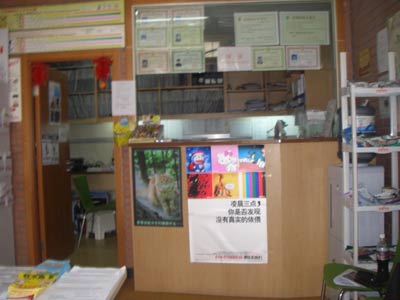By Valerie Sartor
Mary Peng is a woman on a mission: simply put she wants to provide the very best veterinary care for people and their pets in Beijing. Along with her partner Frank Fan she has created a state of the art 5000 square foot veterinary hospital with 15 staff members in the Chaoyang District. "We wanted to create a place in China that was comfortable, where you and your pet would be treated with kindness and respect," she said.
Not only does she have a full service international standard vet hospital with western trained veterinary doctors (DVMs) and local Chinese vets but also she offers dog grooming, pet boarding, and a pet store stocked with safe foods and excellent accessories for animals. Moreover, her hospital has an official government license to dispense the rabies vaccine.

Ms. Peng also sponsors on-going academic learning exchanges between veterinarians from Western countries and Chinese veterinarians.
Mary Peng is like the sun: she's a radiant ball of energy when it comes to talking about her life's work. Small, attractive and extremely articulate, she exudes enthusiasm toward pets, their owners and her hospital.
"When I first moved to China in 1991 I saw that pets were not really popular. In fact, it was in the early 1990s in Beijing when I saw my first handful of Pekinese dogs. Prior to 1992 dogs were not allowed in Beijing. But at that time to register dogs was very expensive, about 5000 RMB and then 2000 RMB on an annual basis. The city had strict rules concerning where you could walk your dog and when you could walk a dog, I think it was before 7 AM and after 7 PM," Ms. Peng said.
In fact, under Chairman Mao's leadership pets were actually discouraged because they were perceived as western bourgeois influences. In the 1950s and 1960s food for people was scarce and too dear for the majority of the population to accommodate pets. People mostly raised agricultural animals that served a purpose.
"When I took my cat to an agricultural university in the early 90's to get her treated I was stunned," Mary Peng recalled. "Everything was geared toward herd animals and everything was done herd style: animals grouped together all getting the same inoculation at the same designated time: there was no personal care, no acknowledgement of the individual animal. That's when I realized there was a great need in China for the very best in veterinary services and holistic healthcare for pets."
Raised in NYC, Ms. Peng was used to having her local vet give her animals individual attention. "And vets back home educated me: they told me the how's and why's of taking care of my animals. They asked pertinent and personal questions, gave me detailed tips and had follow-up visits. In China veterinary medicine is geared toward agricultural production – preventing disease and promoting longevity – it does not focus much on small companion animals, they're an afterthought."
She went on to explain that until recently many animals were either owned collectively or treated as communal property so this western veterinary concept for smaller animals is relatively new. "You've seen people taking turns feeding wild cats in their neighborhood, they're kind to the animals but no one really takes ownership so the animals do not receive the best care," she said.